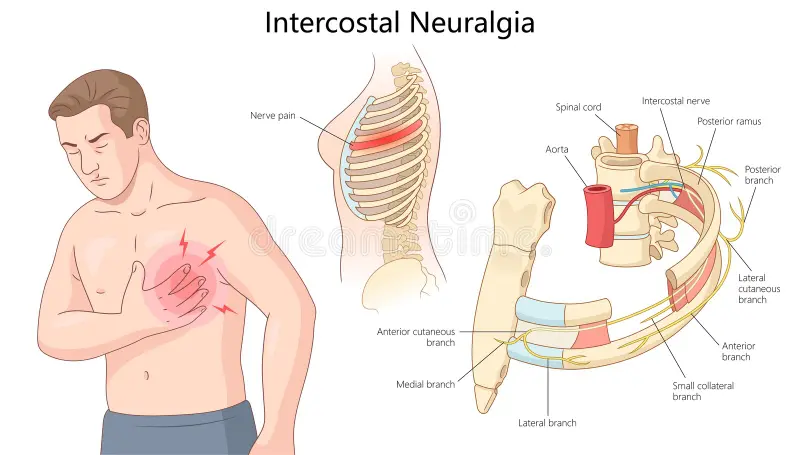
A few years ago, I suffered an accident that left me with a couple of broken ribs. While the continuous aching pain from the fractures was challenging, I also experienced intermittent sharp, burning, and electric sensations radiating around my chest. This disruption was caused by intercostal neuralgia pain, which can significantly affect daily life. Intercostal neuralgia results from irritation or damage to the intercostal nerves running between your ribs. By understanding its causes, symptoms, and treatment options, you can take steps to regain control and improve your quality of life.
What Is Intercostal Neuralgia?
Intercostal neuralgia refers to pain originating from the intercostal nerves. These nerves carry signals from your spinal cord to the muscles and skin around your chest and abdomen. When these nerves become inflamed or damaged, it can result in significant discomfort known as intercostal neuralgia pain.
Common Causes of Intercostal Neuralgia Pain
Several factors can contribute to intercostal neuralgia, including:
- Injuries: Trauma to the ribs or thoracic spine, such as fractures or severe impacts, can compress or damage intercostal nerves. These injuries often result from accidents, falls, or sports-related activities, leading to persistent pain if left untreated.
- Surgery: Procedures involving the chest or upper abdomen, such as thoracotomy, may irritate the nerves.
- Shingles: The varicella-zoster virus can inflame intercostal nerves, causing severe pain. This condition often manifests as postherpetic neuralgia, a long-lasting nerve pain that persists after a shingles infection.
- Spinal Conditions: Conditions like herniated discs or spinal arthritis in the thoracic region can exert pressure on these nerves.
- Tumors: Abnormal growths, whether benign or malignant, along the ribcage or spine may compress intercostal nerves. Tumors can directly exert pressure on the nerves, causing irritation or damage that results in pain. In some cases, treatments like surgery, radiation, or chemotherapy for these tumors can also lead to intercostal neuralgia, making early detection and comprehensive care essential.
Recognizing the Symptoms of Intercostal Neuralgia Pain
Intercostal neuralgia pain often presents as a sharp, burning, or stabbing sensation that follows the path of the ribs. This pain can vary in intensity and may become more severe with physical activity or certain movements. Additional symptoms to watch for include:
- Tenderness: The ribcage area may feel sensitive to touch.
- Muscle Spasms: You might experience twitching or involuntary muscle movements in the affected area.
- Pain Triggers: Activities such as coughing, sneezing, or taking deep breaths can exacerbate the pain.
- Tingling or Numbness: Some individuals report a sensation of tingling or a loss of feeling along the nerve path.
Being aware of these symptoms can help you identify intercostal neuralgia early and seek appropriate treatment to alleviate discomfort.
How Is Intercostal Neuralgia Diagnosed?
Diagnosing intercostal neuralgia pain often involves a detailed medical history, focusing on prior chest injuries, surgeries, or conditions like shingles, and a thorough physical exam. A doctor may:
- Assess your pain’s location and characteristics
- Review your medical and surgical history
- Order imaging tests, such as X-rays, CT scans, or MRIs, to identify potential underlying causes
- Perform nerve block injections to confirm the source of the pain
Effective Treatments for Intercostal Neuralgia Pain
Intercostal neuralgia can be managed through a combination of therapies tailored to your specific needs. Treatment options include:
- Medications: Pain relievers, anti-inflammatory drugs, and nerve pain medications like gabapentin or duloxetine can help reduce symptoms. Duloxetine, in particular, is effective in managing nerve pain by altering pain perception and improving overall comfort.
- Physical Therapy: Targeted exercises and stretches can improve mobility and reduce muscle tension, such as gentle side stretches or yoga poses like Child’s Pose.
- Interventional Procedures: Nerve blocks or radiofrequency ablation may provide long-term relief by interrupting pain signals.
- Lifestyle Adjustments: Gentle activities, stress management, and maintaining good posture can help alleviate strain on the nerves.
When to Seek Help for Intercostal Neuralgia Pain
If intercostal neuralgia pain persists or worsens despite initial treatments, it’s essential to consult a pain specialist. At Red Butte Pain Solutions, we offer personalized care plans to help you manage your condition and improve your quality of life.
Take the First Step Toward Pain Relief
You don’t have to live with intercostal neuralgia pain. Treatments like medications, physical therapy, and nerve blocks can help. Contact Red Butte Pain Solutions today to schedule a consultation. Call us at 602-633-4334 or schedule online to begin your journey to relief.
